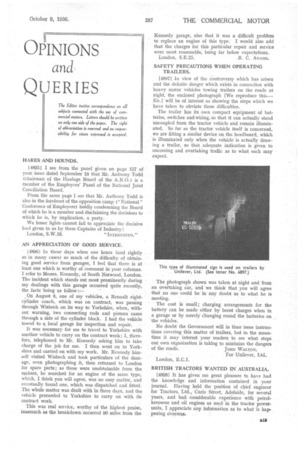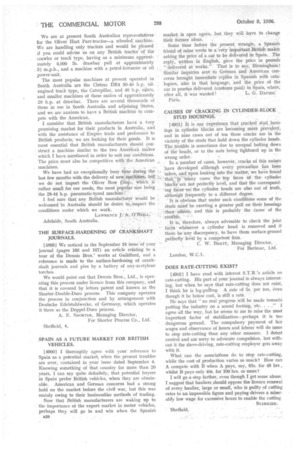OPINIONS
Page 53

Page 54

If you've noticed an error in this article please click here to report it so we can fix it.
and
QUERIES
HARES AND HOUNDS.
[4895] I see from the panel given on page 157 of your issue dated September 18 that Mr. Anthony Todd (chairman of the Haulage Board of the A.R.0.) is a member of the Employers' Panel of the National Joint Conciliation Board.
From tile same page I see that Mr. Anthony Todd is also in the forefront of the opposition camp ("National" Conference of Employers) boldly condemning the Board of which he is a member and disclaiming the decisions to which he is, by implication, a party.
We lesser lights cannot fail to appreciate the decisive lead given to us by these Captains of Industry!
London, S.W.16. "INTERESTED."
AN APPRECIATION OF GOOD SERVICE.
I.48981 In these days when one hears (and rightly so in many cases) so much of the difficulty of obtaining good service from garages, I feel that there is at least one which is worthy of comment in your columns.
refer to Messrs. Kennedy, of South Norwood, London. The incident which stands out most prominently during my dealings with this garage occurred quite recently, the fat s' being as follow:—
On August 8, one of my vehicles, a Renault eight.. cylinder coach, which was on contract, was passing through Wisbech on its way to Yorkshire, when, without warning, two connecting rods and pistons came through a side of the cylinder block. I had the vehicle towed to a local garage for inspection and repair.
It was necessary for me to travel to Yorkshire with another vehicle to carry on the contract work; I, therefore, telephoned to Mr. Kennedy asking him to take charge of the job for me. I then went on to Yorkshire and carried on with my work. Mr. Kennedy himself visited Wisbech and took particulars of the damage, even photographing it, then returned to London for spare parts ; as these were unobtainable from the makers, he searched for an engine of the same type, which, I think you will agree, was no easy matter, and eventually found one, which was dispatched and fitted. The whole matter was dealt with in three days, and the vehicle proceeded to Yorkshire to carry on with its contract work.
This was real service, worthy of the highest praise, inasmuch as the breakdown occurred 90 miles from the
Kennedy garage, also that it was a difficult problem to replace an engine of this type. I would also add that the charges for this particular repair and service were most reasonable, being far below expectations.
London, S.E.25. R. C. ADAMS.
SAFETY PRECAUTIONS WHEN OPERATING TRAILERS.
14897] -In view of the controversy which has arisen and the definite danger which exists in connection with heavy motor vehicles towing trailers on the roads at night, the enclosed photograph [We reproduce this.—. ED.I will be of interest as showing the steps which we have taken to obviate these difficulties.
The trailer has its own compact equipment of batteries, switches and wiring, so that it can actually stand uncoupled from the tractor vehicle and remain illuminated. So far as the tractor vehicle itself is concerned, we are fitting a similar device on the headboard, which is illuminated only when the vehicle is actually drawing a trailer, so that adequate indication is given to oncoming and overtaking traffic as to what each may expect.
The photograph shown was taken at night and from an overtaking car, and we think that you will agree • that no one could be in any doubt as to what he is meeting.
• The cost is small; charging arrangements for the battery can be made either by boost charges when in a garage or by merely changing round the batteries on the vehicles.
No doubt the Government will in time issue instructions covering this matter of trailers, but in the meantime it may interest your readers to see what steps our own organization is taking to minimize the dangers
of the roads. JQIIN WAT...rox,
• For Unilever, Ltd. London, E.C.1.
BRITISH TRACTORS WANTED IN AUSTRALIA.
[48981 It has given me great pleasure to have had the knowledge and information contained in your journal. Having held the position of chief engineer for Tractors, Ltd., Curie Street, Adelaide, for several years, and had considerable experience with petrolkerosene and oil engines as used in the tractor powertmits, I appreciate any information as to what is happening Overseas. • We are at present South Australian representatives for the Oliver Hart Parr-tractor—a wheeledmachine. We are handling only tractors and would be pleased if you could advise us on any British tractor of, the crawler or track type, having as a minimum approximately 4,000 lb. drawbar pull at approximately 31 m.p.h., and a machine with a petrol-kerosene or oil power-unit.
The most popular machines at present operated in South Australia are the Cletrac DR4 30-40 h.p. oilengined track type, the Caterpillar, and 40 h.p. oilers, and smaller machines of these makes of approximately 20 h.p. at drawbar. There are several thousands ot these in use in South Australia and adjoining States, and we are anxious to have a British machine to dempete with the American.
I consider that British manufacturers have a Very promising market for their products in Australia, and with the assistance of Empire trade and preference to British products, we are looking for their goods. It is most essential that British manufacturers should construct a machine similar to the two American makes which I have mentioned in order to suit our conditions. The price must also be competitive with the American machines.
We have had an exceptionally busy time during the last few months with the delivery of new'maCliiiaes, but we do not import the Oliver Row Crop., which is rather small for our needs, the most popular size being the 28-44 h.p. pneumatic-tyred machine.'
I feel sure that any British manufacturer would be welcomed in Australia should he desire to,inspect the conditions under which we work.
LAWRENCE j.' A. O'NEILL. Adelaide, South Australia.
THE SURFACE-HARDENING OF CRANKSHAFT JOURNALS.
[4899] We noticed in the September 18 issue of your journal (pages 166 and 167) an article relating to a tour of the Dennis Bros. works at Guildford, and a reference is made to the surface-hardening of crankshaft journals and pins by a battery of oxy-acetylene torches.
We would point out that Dennis Bros., Ltd., is operating this process under licence from this company, and that it is covered by letters patent and known as the Shorter-Double-Duro process. This company operates the process in conjunction and by arrangement with Deutsche Edelstahlwerke, of Germany, which operates it there as the Doppel-Duro process.
A. E. SuoarEa, Managing Director, For Shorter Process Co., Ltd. Sheffield, 4.
SPAIN AS A FUTURE MARKET FOR BRITISH VEHICLES.
[4900] I thoroughly agree with your reference to Spain as a potential market, when the present troubles are over, contained in your issue dated September 4. Knowing something of that country for more than 20 years, I can say quite definitely, that potential buyers in Spain prefer British vehicks, when they are obtainable. American and German concerns had a strong hold on the market before the civil war, but this was mainly owing to their businesslike methods of trading.
Now that British manufacturers are waking up to the importance of the export market in motor vehicles, perhaps they will go in and win when the Spanish B20 market is open again, but they will have to change their former ideas. .
Some time before the present wrangle, a Spanish friend of some wrote to a very important British maker asking the price of a car to be delivered in Spain. The reply, written in English, gave the price in pounds " delivered at works." That is to say, Birmingham] Similar inquiries sent to German and American concerns brought immediate replies in Spanish with catalogues, aLso in that language, and the price of the car in pesetas delivered (customs paid) in Spain, where,
after all, it was wanted! L. G. DAVIES. Paris.
CAUSES OF CRACKING IN CYLINDER-BLOCK
STUD HOUSINGS.
[40011 It is our experience that cracked stud honeings in cylinder blacks are becoming more pievalent, and in nine cases out of ten these cracks are in the vicinity of the studs that hold down the cylinder heads. The droUble is sometimes due to unequal bolting down of the heads, or to the nuts being tightened up in the wrong order.
In a number of cases, however, cracks of this nature have developed although every: precaution has been taken, and upon looking into the matter, we have found that in .'irlany cases the top faces Of the cylinder blocks -are not perfectly level, and that the correspond • ' big faces-on-the cylinder heads are also out of truth, although frequently to a different degree.
It is obvious that under such conditions some of the studs anist be exerting a greater pull on their housings 'than' others, and this is probably the cause' of the trouble.
It is, -therefore, always advisable to check the joint
• fa.deS 1,i:than-ever a cylinder head is removed and if there be-any discrepancy, to have them surface-ground perfectly level by a competent firm.
C. W. BRErr, Managing Director,
Far Barimar, Ltd.
London, W.C.1.
DOES RATE.CUTTING EXIST?
[4902] I have read with interest S.T.R.'s article on rate-cutting. His part of your journal is always interesting, but when he says that rate-cutting does not exist, I think he is leg-pulling. A rate of 5s. per ton, even though it be below cost, is still a rate.
He says that "no real progress will be made towards putting the industry on a sound footing, etc. • . ." I agree all the way, but he seems to me to miss the most important factor of stabilization—perhaps it is too dangerous 'ground. The compulsory payment of fair wages and observance of hours and labour will do more to stop rate-cutting than any other measure. I detest control and am sorry to advocate compulsion, but without it the slave-driving, rate-cutting employer gets away with it.
What can the associations do to stop rate-cutting, while the cost of production varies so much? How can A compete with B when A pays, say, 61s. for 48 bra , whilst B pays only 40s. for 100 hrs. or more?
I will go a step farther, even though I get some abuse. I suggest that hauliers should oppose the licence renewal of every haulier, large or small, who is guilty of cutting rates to an impossible figure and paying drivers a miserably low wage for excessive hours to enable the cutting
STABILIZE, Sheffield.




























































































